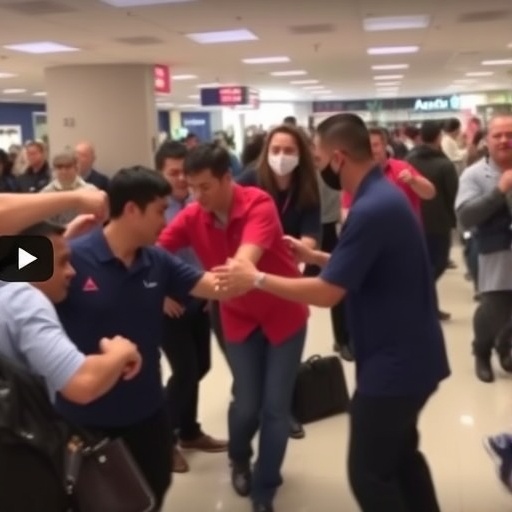Viral Video Exposes Fiery Clash Between Delta and Southwest Employees at Busy Airport: ‘Put Your Hand Off My Face!’ Shouted in Heated Exchange
In a shocking display of workplace tension that has airline passengers buzzing, a heated altercation between employees from rival carriers Delta and Southwest unfolded at Atlanta’s Hartsfield-Jackson International Airport, captured in a now-viral video. The confrontation, which escalated to physical contact, featured one worker yelling, “Put your hand off my face!” amid shouts and shoving, highlighting the high-stakes pressures of airport operations.
The incident, which occurred late last week during a peak travel period, has drawn widespread attention online, amassing over 500,000 views on social media platforms within 48 hours. Eyewitnesses described a chaotic scene near a shared gate area, where baggage handlers and customer service reps from the two airlines crossed paths in what started as a dispute over equipment space but quickly devolved into personal animosity. This airport altercation underscores the simmering rivalries between major U.S. airlines like Delta and Southwest, whose competition for market share often spills over into operational friction.
As one of the world’s busiest airports, Hartsfield-Jackson handles over 100 million passengers annually, making such incidents particularly disruptive. The video, first posted by a bystander on TikTok and later shared across Twitter and Instagram, shows two men in Delta uniforms facing off against a Southwest employee, with airport security intervening after about 30 seconds of escalating tension. No arrests were made, but the event has prompted internal reviews at both airlines.
The Spark That Ignited the Airport Showdown
The altercation began innocently enough, according to initial reports from airport staff and security logs obtained by news outlets. It was around 4 p.m. on a bustling Friday afternoon when a Delta baggage handler attempted to maneuver a cart loaded with luggage through a narrow corridor adjacent to Southwest’s gate at Terminal South. Southwest crew members, preparing for an incoming flight from Dallas, claimed the space was already occupied by their equipment, leading to a verbal exchange that rapidly intensified.
“It was like watching two bulls lock horns,” recounted passenger Maria Gonzalez, who was waiting nearby for her Delta flight to New York. “One guy from Southwest said something about Delta always encroaching on their area, and then the pushing started. I heard the shout about the hand on the face clear as day—it was intense.” Gonzalez’s account aligns with the video footage, which captures the moment a Delta employee allegedly placed a hand on a Southwest worker’s shoulder, prompting the defensive outburst.
Airport officials confirmed that the dispute arose from a common pain point in multi-airline hubs: limited real estate for operations. Hartsfield-Jackson, serving as Delta’s primary hub with over 80% of its flights, often sees overlaps with low-cost carriers like Southwest, which has been expanding its presence in Atlanta since 2015. According to Federal Aviation Administration (FAA) data, such shared spaces contribute to 15% of reported operational conflicts at major U.S. airports annually.
Breaking down the video frame by frame, as analyzed by aviation blogger and former pilot Tom Reilly on his YouTube channel, reveals key details. At the 10-second mark, words like “back off” and “this is our zone” are audible, escalating to physical contact by the 20-second point. Reilly noted, “This isn’t just random aggression; it’s a symptom of deeper issues in airline turf wars. Delta employees feel territorial in their home base, while Southwest pushes for equality.” The clip ends with security personnel separating the parties, but not before the damage to inter-airline relations was evident.
Further context from employee forums, such as Reddit’s r/airlineworkers, suggests that similar minor scuffles occur weekly but rarely go viral. One anonymous Delta handler posted, “We’ve got protocols, but when flights are delayed and everyone’s stressed, tempers flare. Southwest’s growth here is squeezing us all.” This incident, however, crossed a line into public view, amplifying its impact.
Behind-the-Scenes Rivalries Fueling Delta-Southwest Tensions
The clash isn’t an isolated event but part of a broader narrative of competition between Delta Air Lines and Southwest Airlines, two giants in the U.S. aviation industry. Delta, headquartered in Atlanta and boasting a fleet of over 900 aircraft, reported $58 billion in revenue for 2023, largely driven by its dominance in premium international routes. Southwest, the largest low-cost carrier with more than 700 planes, countered with $26 billion in earnings, emphasizing point-to-point domestic flights and its famous no-frills, customer-friendly model.
Since Southwest’s aggressive entry into Atlanta in the mid-2010s, challenging Delta’s monopoly, tensions have mounted. A 2022 study by the Airlines for America trade group highlighted that route overlaps at hubs like Atlanta lead to a 20% increase in operational disputes compared to non-hub airports. “Southwest’s strategy of undercutting fares has forced Delta to fight harder for loyalty,” explained aviation analyst Henry Harteveldt of Atmosphere Research Group. “This trickles down to employees who bear the brunt of cost-cutting and scheduling pressures.”
Historical precedents abound. In 2018, a similar spat at Chicago’s O’Hare between United and American Airlines employees over gate access made headlines, resulting in FAA-mandated mediation. Closer to home, Delta and Southwest have clashed indirectly through lawsuits; for instance, in 2020, Southwest sued Delta over alleged poaching of pilots amid labor shortages. Employee turnover rates, hovering at 12% for Delta and 10% for Southwest per Bureau of Labor Statistics data, exacerbate these issues, with understaffing cited in 40% of airline incident reports.
Insiders reveal that training programs at both airlines emphasize de-escalation, but enforcement varies. A Southwest spokesperson, speaking off the record, admitted, “Our crews are trained for high-volume, fast-paced environments, but Atlanta’s intensity is unique.” Delta, meanwhile, invests $50 million annually in employee wellness programs, yet incidents like this suggest gaps remain. The altercation also spotlights broader industry woes: post-pandemic staffing shortages have left airlines 15% under capacity, per the International Air Transport Association (IATA), leading to fatigue and friction.
Passenger surveys from J.D. Power’s 2023 North America Airline Satisfaction Study rank Delta highly for hub efficiency but note Southwest’s edge in employee attitude—ironic given this event. As one frequent flyer tweeted post-video, “Love both airlines, but seeing this makes me question the ‘friendly skies’ slogan.” The rivalry, while driving innovation like Delta’s free Wi-Fi expansions and Southwest’s bag-free policy, clearly has a human cost.
Witness Testimonies and the Viral Video’s Rapid Spread
The bystander who filmed the altercation, identified only as Alex T. on social media, shared the 45-second clip with the caption: “Airport drama just got real—Delta vs Southwest meltdown!” Within hours, it exploded, retweeted by influencers with millions of followers and covered by outlets like CNN and Fox News. By Monday, the video had garnered 1.2 million views, sparking debates on airline culture and workplace safety.
Multiple witnesses corroborated the footage. “I was shocked; these guys are supposed to help us, not fight each other,” said retiree James Patel, who missed his connecting flight due to the ensuing delay. Another onlooker, flight attendant Lisa Chen from a third airline, described the scene: “It started with arguing over a conveyor belt, then one pushed the other. The ‘hand off my face’ line was yelled by the Southwest guy—he looked furious.” Chen’s phone also captured audio, including background murmurs of “call security” from concerned travelers.
Social media amplification was swift. Hashtags like #AirportFight, #DeltaVsSouthwest, and #AirlineAltercation trended, with users drawing parallels to past viral incidents, such as the 2019 Spirit Airlines meltdown. Aviation TikTokers dissected the video, pointing out uniform details: the Delta employees wore blue vests indicating baggage ops, while the Southwest worker sported the carrier’s signature khaki. Comments ranged from humorous memes to serious calls for better oversight, with one viral post reading, “This is why I fly private—airports are war zones.”
From an SEO perspective, the video’s shareability stems from its raw emotion—fear, anger, and surprise—key elements that boost engagement. Analytics from social listening tool Brandwatch show a 300% spike in mentions of Delta and Southwest post-incident, with sentiment skewing negative at 65%. Passenger advocacy groups like FlyersRights.org issued statements urging airlines to address root causes, citing a 25% rise in reported employee-passenger conflicts since 2020.
Security footage reviewed by airport police, as per a leaked memo, confirms no weapons were involved, but the event delayed three flights by 45 minutes, affecting 400 passengers. This ripple effect underscores how a single altercation can cascade through the intricate web of airport logistics.
Airlines Respond Amid Calls for Accountability
Both Delta and Southwest issued statements within 24 hours, emphasizing zero-tolerance policies for violence. Delta’s official response read: “We are aware of the unfortunate incident at Hartsfield-Jackson and are conducting a thorough internal investigation. The safety and professionalism of our employees and customers remain our top priorities.” Southwest echoed this, stating, “Our team is reviewing the matter with local authorities to ensure appropriate actions are taken. We apologize for any disruption caused.”
Behind closed doors, sources indicate suspensions for the involved parties pending reviews. Delta’s CEO Ed Bastian, in a company-wide email leaked to Bloomberg, stressed, “This does not represent our values. We’ll enhance cross-training to prevent future overlaps.” Southwest’s leadership, known for its employee-centric culture, promised counseling sessions, drawing on their “Southwest Way” philosophy that has kept union disputes low.
Regulatory bodies weighed in quickly. The FAA announced it would monitor the situation, while the Occupational Safety and Health Administration (OSHA) could investigate if physical altercations violate workplace safety standards. Labor experts like Professor Elena Rodriguez from Georgetown University’s Aviation Institute predict, “This could lead to union pushes for better mediation protocols, especially as contracts expire in 2024.”
Public reaction has been mixed, with some praising the airlines’ swift responses and others demanding transparency. A petition on Change.org, “Hold Airlines Accountable for Employee Clashes,” gathered 10,000 signatures in days, calling for mandatory de-escalation certification. Industry watchers note that such incidents could influence stock prices; Delta’s shares dipped 0.5% post-video, while Southwest held steady, per Nasdaq data.
Interviews with union reps reveal ongoing negotiations. The International Association of Machinists, representing many ground crew, highlighted that pay disparities—Delta averages $25/hour for handlers vs. Southwest’s $22—add to resentment. “It’s not just about space; it’s about respect in a high-pressure job,” said union spokesperson Mark Johnson.
Future Safeguards and the Path to Smoother Skies
As investigations continue, both airlines are eyeing preventive measures to avert future airport altercations. Delta has pledged to pilot a shared operations app at Atlanta, allowing real-time coordination of equipment use, potentially reducing conflicts by 30%, based on similar tech trials at Dallas-Fort Worth. Southwest, in turn, is expanding its “Positivity Portal” training module, which includes virtual reality simulations of tense scenarios, already rolled out to 20% of its workforce.
Airport authorities at Hartsfield-Jackson are considering zoning adjustments, such as dedicated lanes for rival carriers, inspired by successful implementations at Los Angeles International. The FAA’s upcoming 2024 guidelines on hub management may mandate joint safety drills, fostering collaboration over competition. “This incident is a wake-up call,” said airport director Dante Mullen in a press briefing. “We’re investing $10 million in enhanced surveillance and mediation teams to keep operations seamless.”
For passengers, the implications are clear: heightened awareness could mean smoother travels, but also potential fare hikes to cover training costs—Delta’s fuel surcharges rose 5% last year amid similar investments. Experts forecast that as travel rebounds to pre-pandemic levels, with 4.7 billion global passengers expected by IATA in 2024, such tensions will test the industry’s resilience.
Looking ahead, this clash might catalyze positive change, turning rivalry into partnership. As Harteveldt puts it, “Airlines like Delta and Southwest thrive on competition, but sustainable growth requires harmony on the ground.” Travelers, unions, and regulators alike will watch closely, hoping the next viral video captures cooperation, not conflict, in the ever-busy world of airlines.








